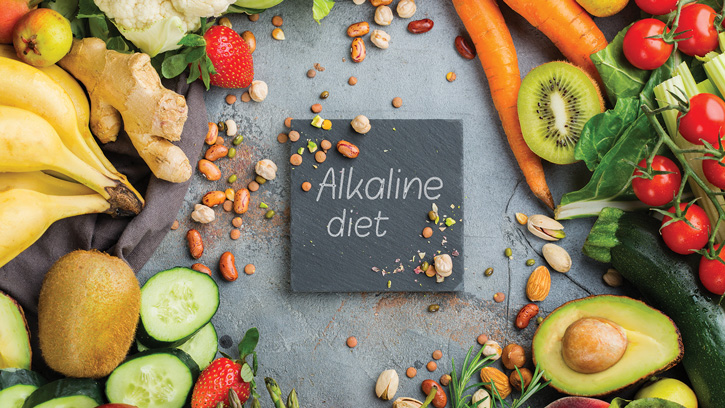Debunking Alkaline Diet Myths
Diet & Nutrition | RESEARCH
In their quest for good health, many consumers have adopted specialized diets designed to reduce their risk for disease. Some eating plans, such as paleo and keto, are fast becoming mainstays. But the alkaline diet, linked with a variety of alleged benefits ranging from weight loss to cancer prevention, also has its share of advocates.
Touted as a cure-all for many common conditions, the alkaline diet encourages greater intake of base-producing foods combined with reduced intake of acid-producing foods. The result is a diet high in fruits, vegetables, and legumes, and low to moderate in protein (Fenton and Huang 2016). Although many claims related to the diet are not supported by scientific evidence, research has shown that in certain circumstances, an alkaline diet may have some therapeutic effects.
Reducing Bone Loss
For people with chronic kidney disease, some evidence suggests that an alkaline diet may help reduce bone demineralization, a condition that occurs when the kidneys’ ability to maintain the body’s acid-base balance by neutralizing acids and excreting excess hydrogen ions and/or anions is impaired (Noce et al. 2021). This imbalance often leads to metabolic acidosis, a state in which the body’s bones may release cations, such as calcium, magnesium, and potassium, that are often tied to alkali salts and can help maintain a normal pH level in the blood. Over time, bone demineralization caused by metabolic acidosis can lead to a reduction in bone mass (Wynn et al. 2010). For people with impaired renal function, consuming an alkaline diet may help reduce bone demineralization.
However, protein intake, especially animal protein, is also thought to contribute to bone demineralization by increasing urinary calcium excretion and providing amino acids methionine and cysteine, whose metabolism has been shown to increase acid load (Wynn et al. 2010). In contrast, other studies have shown that protein supplementation reduces bone loss in elderly subjects. One possible explanation for this discrepancy is that the bone mineral loss associated with high protein intake may actually be a result of the low fruit and vegetable intake that sometimes accompanies it (Wynn et al. 2010).
With respect to cancer, there is limited evidence to support the claim that an alkaline environment reduces disease risk or increases the effectiveness of certain chemotherapy drugs (Fenton and Huang 2016). Although increased consumption of fruits, vegetables, and legumes is associated with a reduced risk of some cancers, it is thought to be due to the foods’ nutritive value rather than their impact on acid-base balance. Moreover, these foods are rich in fiber, which has been shown to decrease risk of colorectal cancers (Fenton and Huang 2016). Additional research is needed to evaluate the use of the alkaline diet in cancer treatment and prevention.
Hypertension is another malady that the alkaline diet has been purported to prevent, but this claim also lacks validation. In a prospective cohort study of 2,241 Dutch adults, dietary acid load was found to have no effect on the development of hypertension over a six-year period (Engberink et al. 2012).
More Research Needed
For healthy individuals able to maintain normal blood pH levels on a diet high in acid-forming foods, an alkaline diet likely has no beneficial effect. However, in individuals with impaired renal function, particularly those who are elderly, an alkaline diet may lead to a reduction in bone loss over time. Further research is needed to determine if the alkaline diet may have useful applications in other diseases and conditions.


